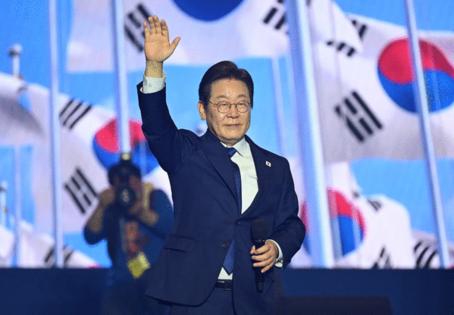A court ruling roils South Korea's presidential election
Published in Political News
SEOUL, South Korea — As South Koreans prepare to elect a successor to ousted former president Yoon Suk Yeol, a court ruling against front-runner Lee Jae-myung has thrust the country — which has been under interim leadership for the last five months — into further uncertainty.
Yoon, who was impeached for declaring martial law in December, was removed from office last month, triggering a snap election that will be held June 3. Since then, the country has been led by a descending order of deputies, including the prime minister, the finance minister and, now, the education minister.
Lee, who until declaring his candidacy last month was the leader of South Korea's liberal opposition party, has been the clear favorite in polls. But his candidacy has been complicated by several criminal trials he has decried as politically motivated.
These troubles came to a head Thursday, when South Korea's Supreme Court overturned a lower court's acquittal of Lee on charges he had violated the country's election law — which prohibits candidates from making "false statements" — and ordered the appeals court to issue a sentence.
If the appeals court rules on Lee's case before the presidential election next month, Lee may be forced out of the running. The Supreme Court ruling will also likely sway moderate voters who may prove crucial in clinching the presidency.
It is a surprising turn that has drawn fire from Lee's supporters, who say the Supreme Court is inappropriately putting its finger on the scale of the election. Of the 12 Supreme Court justices, all but two — who both issued dissenting opinions — were nominated by Yoon, a conservative.
In the wake of the ruling, Lee's opponents have called for his withdrawal from the race.
"Although the sentence has yet to be confirmed, Lee's disqualification from the election is only a matter of time," wrote Lee Jun-seok, a conservative candidate. "The Democratic Party should respect the Supreme Court's decision and immediately replace him as the party candidate."
Many legal experts have expressed skepticism at the Supreme Court's decision, which was unusually swift.
Lee's first trial took just over two years, and the second took around four months. The Supreme Court, however, issued its decision after just eight days of deliberation.
"I am doubtful whether there was enough time for the 12 justices to sufficiently review and debate the vast number of trial documents," wrote Hong Sung-soo, a law professor at Sookmyung Women's University in Seoul, in a social media post Friday. "Even with help from research judges, there is still a minimum amount of time that this will take."
Under South Korean election law, candidates are forbidden from lying about themselves or their opponents and can face up to seven years in prison for doing so. Those found guilty are prohibited from running for public office for five years if their penalty is 1 million won ($717) in fines or greater.
The two false statements Lee is accused of making date back to his second presidential run in 2021 — a race he ultimately lost to Yoon — and concern a controversial real estate development project in the city of Seongnam where Lee was mayor from 2010-18.
During his campaign, Lee claimed that a photograph showing him with a municipal official implicated in the project was doctored — and that he didn't know the official. He also stated that a re-zoning decision he made during that time was due to pressure from the central government.
Prosecutors indicted Lee, arguing the two statements were false.
The first court found Lee guilty last November. But the appeals court disagreed four months later, saying that Lee's claims should be understood as subjective viewpoints, rather than factual statements.
Many legal scholars have argued that this provision in the country's election law — which politicians from both sides have weaponized against their opponents — violates both the spirit of free political expression and the prerogative of citizens to judge the truthfulness of their leaders' statements on their own terms.
That was the warning issued by the two Supreme Court justices who voted against the ruling against Lee. "The various statements that are made during the course of an election are a mixture of facts, opinions and judgments that, existing within the context of political interests, cannot always be clearly defined as true or false," they wrote.
"But the judiciary is nonetheless still responsible for maintaining political impartiality, and for it to intervene in this mixed-up realm of politics and sort truth from falsehood is itself an act that compromises its political impartiality."
©2025 Los Angeles Times. Visit at latimes.com. Distributed by Tribune Content Agency, LLC.




























































Comments